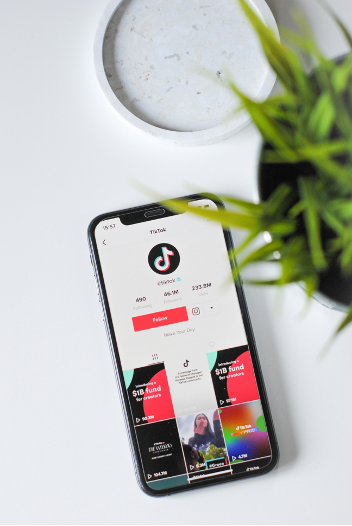By: Emma Betz, Staff Writer

Photo Courtesy of Unsplash
What started in September of 2016 as a viral software application sensation has suddenly become a topic of discussion in the United States for both the House of Representatives and the Senate.[1] The social media app that many users engage with throughout various countries began in China as “Douyin” – a platform that emphasized the creation of short, engaging videos for a younger audience.[2] TikTok officially launched in the United States in August of 2018 and by March of 2019, TikTok’s popularity grew throughout the consumer market, surpassing one billion downloads across the world on Apple’s App Store and Google Play.[3]
Although TikTok quickly became popular for many users throughout the United States, the app has not been “popular” with United States lawmakers who feel that our national security has been threatened, and privacy issues would continue to arise as a result of foreign adversary-controlled applications.[4]
To subside the national security threats and protect the privacy of the United States and its citizens, Rep. Mike Gallagher (R-WI) and Rep. Raja Krishanmoorthi (D-IL), Chairman and Ranking Member of the House Select Committee on the Strategic Competition Between the United States and the Chinese Communist Party, introduced to the House of Representatives the Protecting Americans from Foreign Adversary Controlled Applications Act.[5] The Act aims to “protect the national security of the United States from the threat posed by foreign adversary controlled applications, such as TikTok,” and any other successor applications “developed or provided by ByteDance, Ltd.” that reach the United States consumer market.[6]
The central issue that comes with foreign adversary-controlled applications is the governing law. TikTok, for example, is a China-based company and therefore, is subject to Chinese laws that require country-operating companies to turn over user data at the request of the Chinese government.[7] In accordance with TikTok’s privacy policy, the company collects the following user information: location data and internet address, keystroke patterns, and the type of device accessing the app.[8] Additional user information can also be collected at the user’s discretion, including the user’s name, age, email, phone number, purchase information including card numbers, phone and social network contacts, and GPS information.[9]
Because of the laws in China, all the aforementioned information may be turned over to the Chinese government at the government’s request.[10] Therefore, what appears to many as a user-friendly, engaging social media app, is actually a severe threat to privacy according to United States lawmakers.[11]
In an effort to protect citizens and national security, on March 13, 2024, the Protecting Americans from Foreign Adversary Controlled Applications Act was quickly passed by the House of Representatives in a 352-65 vote.[12] The Act, however, now sits with a Senate comprised of Senators who feel less of an urgency to act on this specific piece of legislation.[13] Many feel that TikTok poses a severe national security threat, [14] others feel that a better approach to safeguarding foreign-controlled apps would be to encompass broader legislation, rather than passing a bill that targets one specific company.[15] Another concern that comes with passing the Act is the retaliation that China may seek against the United States in response to the ban.[16]
Although President Biden has made statements that he plans to sign legislation that could lead to a ban of TikTok, the fate of the popular application now rests with the Senate.[17]
[1] James Hardy, Unveiling the Genius: Who Invented TikTok and the Story Behind Its Founder (February 5, 2024) https://historycooperative.org/who-invented-tiktok/
[2] Id.
[3] TikTok: Technology Overview and Issues, Congressional Research Service (June 30, 2023) https://sgp.fas.org/crs/misc/R46543.pdf ; Yingzhi Yang and Brenda Goh, Timeline: TikTok’s journey from global sensation to Trump target (August 5, 2020) https://www.reuters.com/article/idUSKCN2510IU/
[4] Sapna Maheshwari, David McCabe and Annie Karni, House Passes Bill to Force TikTok Sale From Chinese Owner or Ban the App, The New York Times (March 13, 2024) https://www.nytimes.com/2024/03/13/technology/tiktok-ban-house-vote.html
[5] Gallagher, Bipartisan Coalition Introduce Legislation to Protect Americans From Foreign Adversary Controlled Applications, Including TikTok, The Select Committee on the CCP (March 5, 2024) https://selectcommitteeontheccp.house.gov/media/press-releases/gallagher-bipartisan-coalition-introduce-legislation-protect-americans-0
[6] Protecting Americans from Foreign Adversary Controlled Applications Act, H.R. 7521, 118th Cong. § 2 (2024).
[7] Congressional Research Service, supra note 3.
[8] Id.; See also TikTok Privacy Policy (January 24, 2024) https://www.tiktok.com/legal/page/us/privacy-policy/en
[9] TikTok Privacy Policy, supra note 8.
[10] Congressional Research Service, supra note 3.
[11] Id.
[12] Scott Wong, Kyle Stewart, and Rebecca Kaplan, House passes bill that could ban TikTok in the U.S., sending it to the Senate, NBC News (March 13, 2024) https://www.nbcnews.com/politics/congress/house-likely-pass-bill-ban-tiktok-sending-senate-rcna142797
[13] Sahil Kapur, Frank Thorp V, and Kate Santaliz, TikTok ban’s fate is uncertain in the Senate, where there is less agency to act, NBC News (March 13, 2024) https://www.nbcnews.com/politics/congress/tiktok-bans-fate-uncertain-senate-less-urgency-act-rcna143162
[14] Id.
[15] Id.
[16] Id.
[17] Caitlin Yilek and Robert Legare, Biden says he would sign TikTok bill that could ban app, CBS News (March 8, 2024) https://www.cbsnews.com/news/biden-tiktok-ban-bill/